Browse Studies
View Studies Archive |
| Employee Perceptions of Federal Workplace Violence |
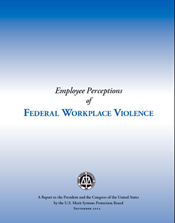 Employee Perceptions of Federal Workplace Violence is based on a 2010 MSPB survey of about 42,000 Federal employees regarding their experiences with violence in the workplace. Nearly 1 in 8 survey respondents indicated that they had seen physical attacks, threats of attack, harassment, intimidation, or bullying in the workplace over the past two years. Over half of the perpetrators of the violence were current or former Federal employees, and one-third were agency customers or clients. Although the majority of instances involved threats, harassment, intimidation, or bullying rather than physical injury or property damage, these behaviors demand the attention of Federal managers because they poison the work environment and may lead to more serious physical violence. Report recommendations include that agencies focus on mitigating violence perpetrated by current Federal employees through prevention programs; that agency prevention strategies take into account organizational geographic location, mission, and occupational mix; and that managers foster organizational cultures that do not tolerate violent behaviors and that take reports of such behaviors seriously. Employee Perceptions of Federal Workplace Violence is based on a 2010 MSPB survey of about 42,000 Federal employees regarding their experiences with violence in the workplace. Nearly 1 in 8 survey respondents indicated that they had seen physical attacks, threats of attack, harassment, intimidation, or bullying in the workplace over the past two years. Over half of the perpetrators of the violence were current or former Federal employees, and one-third were agency customers or clients. Although the majority of instances involved threats, harassment, intimidation, or bullying rather than physical injury or property damage, these behaviors demand the attention of Federal managers because they poison the work environment and may lead to more serious physical violence. Report recommendations include that agencies focus on mitigating violence perpetrated by current Federal employees through prevention programs; that agency prevention strategies take into account organizational geographic location, mission, and occupational mix; and that managers foster organizational cultures that do not tolerate violent behaviors and that take reports of such behaviors seriously. See more inside… |
| Blowing the Whistle: Barriers to Federal Employees Making Disclosures |
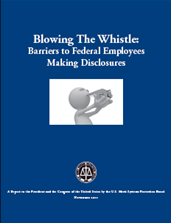 This report compares data from Merit Principles Surveys conducted in 1992 and 2010 to describe the extent to which perceptions of retaliation against Federal employees who report wrongdoing remains a serious problem. The results indicate that if an agency creates a culture where its employees believe that management wants to be told about wrongdoing and will address issues raised by employees, then employees are more likely to notify management when they see a problem. The report also explains why agencies should do more to ensure that employees receive quality training about how they can disclose wrongdoing and how they can exercise their rights if they perceive that they have experienced retaliation for whistleblowing activities. This report compares data from Merit Principles Surveys conducted in 1992 and 2010 to describe the extent to which perceptions of retaliation against Federal employees who report wrongdoing remains a serious problem. The results indicate that if an agency creates a culture where its employees believe that management wants to be told about wrongdoing and will address issues raised by employees, then employees are more likely to notify management when they see a problem. The report also explains why agencies should do more to ensure that employees receive quality training about how they can disclose wrongdoing and how they can exercise their rights if they perceive that they have experienced retaliation for whistleblowing activities. See more inside… |
| Telework: Weighing the Information, Determining the Appropriate Approach |
This report uses survey data from Federal employees and supervisors, and 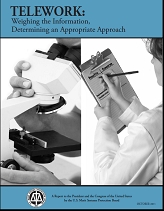 other information, to provide a holistic depiction of the key benefits, concerns, and implementation considerations for organizations to weigh when determining how to integrate telework into their business strategy. The report emphasizes that the realization of telework's benefits and the mitigation of its concerns will depend on an appropriate approach to telework for a given situation and on effective management of employees within that approach. The report also discusses several key steps that organizations can take to support effective telework, such as fostering a culture conducive to telework; ensuring supervisors have good performance management skills; and ensuring a well thought-out technology infrastructure. The report's central message is the importance of weighing the applicable benefits of and concerns about telework with legal requirements and implementation considerations when making decisions about how to appropriately use telework in a given situation. other information, to provide a holistic depiction of the key benefits, concerns, and implementation considerations for organizations to weigh when determining how to integrate telework into their business strategy. The report emphasizes that the realization of telework's benefits and the mitigation of its concerns will depend on an appropriate approach to telework for a given situation and on effective management of employees within that approach. The report also discusses several key steps that organizations can take to support effective telework, such as fostering a culture conducive to telework; ensuring supervisors have good performance management skills; and ensuring a well thought-out technology infrastructure. The report's central message is the importance of weighing the applicable benefits of and concerns about telework with legal requirements and implementation considerations when making decisions about how to appropriately use telework in a given situation. See more inside… |
| Prohibited Personnel Practices: Employee Perceptions |
In this report MSPB describes what each PPP means as a practical matter, how frequently 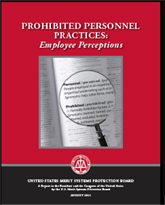 Federal employees perceive each practice occurring, and the consequences for an agency when its employees believe that management is committing one or more PPPs. Federal employees perceive each practice occurring, and the consequences for an agency when its employees believe that management is committing one or more PPPs. In addition, relying upon data from Merit Principles Surveys conducted between 1992 and 2010, this report explains that perceptions of many PPPs are at an 18-year low. However, the report also demonstrates that agencies should be vigilant to prevent the occurrence of PPPs, or even the perception that PPPs are taking place. See more inside… |
| Women in the Federal Government: Ambitions and Achievements |
This report assesses the treatment and advancement of women in the Federal Government. 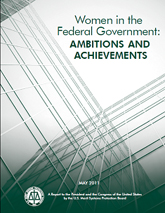 MSPB finds that much has changed for the better since its 1992 report "A Question of Equity: Women and the Glass Ceiling in the Federal Government." For example, women hold an increased proportion of positions in the Senior Executive Service, and fewer women report that they are subjected to discrimination or stereotypes. However, the vision of a workforce in which women are fully represented and utilized has not been wholly achieved. Federal agencies may need to reexamine their approaches to recruitment, work assignment, or leadership development to address contemporary challenges such as continuing occupational differences between women and men. The report outlines recommendations that Federal agencies, managers, and employees can take to promote workplace fairness and the full utilization of all employees. See more inside… MSPB finds that much has changed for the better since its 1992 report "A Question of Equity: Women and the Glass Ceiling in the Federal Government." For example, women hold an increased proportion of positions in the Senior Executive Service, and fewer women report that they are subjected to discrimination or stereotypes. However, the vision of a workforce in which women are fully represented and utilized has not been wholly achieved. Federal agencies may need to reexamine their approaches to recruitment, work assignment, or leadership development to address contemporary challenges such as continuing occupational differences between women and men. The report outlines recommendations that Federal agencies, managers, and employees can take to promote workplace fairness and the full utilization of all employees. See more inside…
|
| MSPB Finalized 2011-2013 Research Agenda |
The U.S. Merit Systems Protection Board (MSPB) 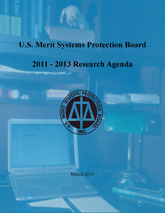 has the statutory responsibility to conduct objective, non-partisan studies that assess and evaluate Federal merit systems policies, operations, and practices. Our studies are typically Government wide in scope and take a long-term perspective on merit and effective human capital management. The prospective nature of the studies function, in conjunction with MSPB’s adjudication of individual appeals and our authority to review human resources regulations, enables MSPB to fulfill its role as guardian of Federal merit systems and ensure the workforce is well managed and free from Prohibited Personnel Practices. has the statutory responsibility to conduct objective, non-partisan studies that assess and evaluate Federal merit systems policies, operations, and practices. Our studies are typically Government wide in scope and take a long-term perspective on merit and effective human capital management. The prospective nature of the studies function, in conjunction with MSPB’s adjudication of individual appeals and our authority to review human resources regulations, enables MSPB to fulfill its role as guardian of Federal merit systems and ensure the workforce is well managed and free from Prohibited Personnel Practices. This document describes the research activities for the next three-year research cycle of MSPB’s Office of Policy and Evaluation (OPE). It has three major sections. The first section describes the outreach activities used to gather research suggestions from OPE stakeholders and the general public. It also provides an overview of the process used to formulate OPE’s research agenda from this input. The second section describes the 8 major OPE research projects currently in progress. The final section describes the 29 new research topics included in the 2011-2013 research agenda. |
| Making the Right Connections: Targeting the Best Competencies for Training |
This report acknowledges that some abilities 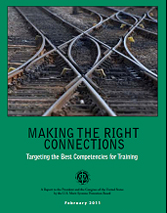 needed for Federal jobs are inherently more difficult to learn than others. It contrasts employee perceptions of how difficult it is to learn certain job-relevant abilities with research findings about the actual trainability of these abilities. MSPB's goal is to help agencies use training resources more effectively. Employee selection can also be more effective when agencies target difficult-to-learn abilities to ensure that persons with those abilities are hired into the workforce. needed for Federal jobs are inherently more difficult to learn than others. It contrasts employee perceptions of how difficult it is to learn certain job-relevant abilities with research findings about the actual trainability of these abilities. MSPB's goal is to help agencies use training resources more effectively. Employee selection can also be more effective when agencies target difficult-to-learn abilities to ensure that persons with those abilities are hired into the workforce. |
| Whistleblower Protections for Federal Employees |
The MSPB report “Whistleblower Protection for Federal Employees” that was released on Tuesday, Dec. 7, 2010 was dated September 2010 because that was when the final draft was approved for publication. The report was not actually released to any source within the government or otherwise until December 7 due to the time needed to accommodate the layout design, printing, and distribution processes.  This report is one in a series of reports the MSPB is undertaking under its studies authority to draw attention to prohibited personnel practices (PPPs) such as whistleblower retaliation. This report addresses in depth the legal challenges that whistleblowers face, including the MSPB's own case law and describes the requirements for a Federal employee's disclosure of wrongdoing to be legally protected as whistleblowing under current statutes and case law. A potential whistleblower's failure to meet even one of these criteria will deprive the MSPB of jurisdiction, meaning that by law, MSPB will be unable to provide any redress in the absence of a different (non-whistleblowing) appeal right. |
| A Call To Action: Improving First-Level Supervision of Federal Employees |
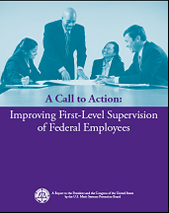 This report examines the effectiveness of Federal first-level supervisors and how well agencies select, develop, and manage them. First-line supervisors, as the nexus between Government policy and action, are critical to productivity, employee engagement, and workplace fairness. This report examines valid selection criteria and processes, comprehensive training programs, good communication and support networks, and sound accountability mechanisms for first-level supervisors. In addition, it discusses how well Federal agencies are managing first-level supervisors and recommends specific measures to improve the management and performance of first-level supervisors. This report examines the effectiveness of Federal first-level supervisors and how well agencies select, develop, and manage them. First-line supervisors, as the nexus between Government policy and action, are critical to productivity, employee engagement, and workplace fairness. This report examines valid selection criteria and processes, comprehensive training programs, good communication and support networks, and sound accountability mechanisms for first-level supervisors. In addition, it discusses how well Federal agencies are managing first-level supervisors and recommends specific measures to improve the management and performance of first-level supervisors. |
| Prohibited Personnel Practices |
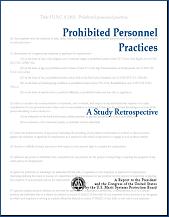 This report announces MSPB’s launching of a reexamination of the prevalence of prohibited personnel practices within the Federal Government, and is issuing this retrospective report to provide its stakeholders a foundation of past MSPB research that explored these issues. MSPB has conducted extensive research to analyze the occurrence of prohibited personnel practices in the Federal Government, as well as adherence to their complement, the merit system principles. Selected previous reports summarized in this report note that the percentage of employees reporting discrimination based on ethnicity/race, sex, age, and religion have declined over time, while an increasing percentage of Federal employees believe that they are being treated fairly. However, MSPB also acknowledges that the Federal Government still has work to do to ensure a workplace free of prohibited personnel practices. This report announces MSPB’s launching of a reexamination of the prevalence of prohibited personnel practices within the Federal Government, and is issuing this retrospective report to provide its stakeholders a foundation of past MSPB research that explored these issues. MSPB has conducted extensive research to analyze the occurrence of prohibited personnel practices in the Federal Government, as well as adherence to their complement, the merit system principles. Selected previous reports summarized in this report note that the percentage of employees reporting discrimination based on ethnicity/race, sex, age, and religion have declined over time, while an increasing percentage of Federal employees believe that they are being treated fairly. However, MSPB also acknowledges that the Federal Government still has work to do to ensure a workplace free of prohibited personnel practices.
|
| Fair and Equitable Treatment: Progress Made and Challenges Remaining |
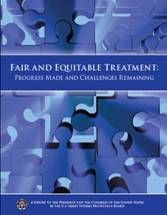 As the guardian of the merit systems principles, the MSPB has a long history of conducting studies to evaluate the “fair and equitable treatment” of all employees, regardless of personal characteristics such as ethnicity/race. This report summarizes workforce data, as well as input from employees, to assess the Federal Government’s progress toward achieving a representative workforce and treating all employees fairly. The results reveal that progress has been made, but some challenges remain. This report provides specific actions that agencies and employees can take to help the Federal Government achieve an efficient, effective and representative workforce. As the guardian of the merit systems principles, the MSPB has a long history of conducting studies to evaluate the “fair and equitable treatment” of all employees, regardless of personal characteristics such as ethnicity/race. This report summarizes workforce data, as well as input from employees, to assess the Federal Government’s progress toward achieving a representative workforce and treating all employees fairly. The results reveal that progress has been made, but some challenges remain. This report provides specific actions that agencies and employees can take to help the Federal Government achieve an efficient, effective and representative workforce. |
| As Supervisors Retire: An Opportunity to Reshape Organizations |
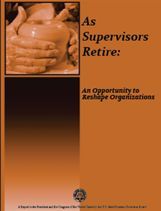 In this report MSPB expounds on large losses expected among the supervisory and managerial workforces due to retirement and their replacements, namely the challenges and opportunities soon to ensue. The report illustrates how the coming retirement wave will afford agency leaders with the opportunity to recruit, select, and develop a new cadre of supervisors having the knowledge, skills, and abilities to function effectively in an increasingly dynamic environment. The report offers agencies recommendations to capitalize on the retirement wave by structuring work units with regard to the job functions, competencies, and the workplace complexities. The report encourages agencies to use the retirement wave as an impetus for establishing procedures to recruit, select, and develop a diverse supervisory workforce with the talent to promote engagement and drive performance. In this report MSPB expounds on large losses expected among the supervisory and managerial workforces due to retirement and their replacements, namely the challenges and opportunities soon to ensue. The report illustrates how the coming retirement wave will afford agency leaders with the opportunity to recruit, select, and develop a new cadre of supervisors having the knowledge, skills, and abilities to function effectively in an increasingly dynamic environment. The report offers agencies recommendations to capitalize on the retirement wave by structuring work units with regard to the job functions, competencies, and the workplace complexities. The report encourages agencies to use the retirement wave as an impetus for establishing procedures to recruit, select, and develop a diverse supervisory workforce with the talent to promote engagement and drive performance. |
| Job Simulations: Trying out for a Federal Job |
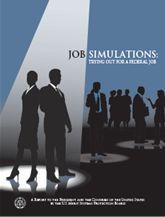 In this report, the MSPB finds that job simulation assessments can be an effective tool to evaluate applicant qualifications. They have many advantages, including relatively high levels of validity, better person-to-job fit because of the realistic job preview, a greater degree of fairness, and generally positive applicant perceptions. This report identifies a number of factors for agencies to consider when making decisions about their assessment process. It also presents a practical, 5-step assessment strategy that agencies should consider adopting. In this report, the MSPB finds that job simulation assessments can be an effective tool to evaluate applicant qualifications. They have many advantages, including relatively high levels of validity, better person-to-job fit because of the realistic job preview, a greater degree of fairness, and generally positive applicant perceptions. This report identifies a number of factors for agencies to consider when making decisions about their assessment process. It also presents a practical, 5-step assessment strategy that agencies should consider adopting. |
| Addressing Poor Performers and the Law |
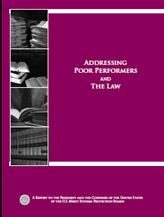 The purpose of this report is to describe the similarities and differences between 5 U.S.C. §§ 4303 and 7513, the two sections of the law that authorize an agency to take an adverse action against a Federal employee for poor performance. As history as shown, poor performers are a serious concern for the Federal workforce, and one that the Government has had difficulties addressing. The biggest obstacle to addressing poor performers in the Federal Government is not created by a statute, but rather is simply a question of how supervisors manage the performance of their employees. This report addresses the limited ability of the law to address the underlying challenges of a performance-based action and t part of the solution which lies in educating and encouraging supervisors in the use of better performance management practices. The purpose of this report is to describe the similarities and differences between 5 U.S.C. §§ 4303 and 7513, the two sections of the law that authorize an agency to take an adverse action against a Federal employee for poor performance. As history as shown, poor performers are a serious concern for the Federal workforce, and one that the Government has had difficulties addressing. The biggest obstacle to addressing poor performers in the Federal Government is not created by a statute, but rather is simply a question of how supervisors manage the performance of their employees. This report addresses the limited ability of the law to address the underlying challenges of a performance-based action and t part of the solution which lies in educating and encouraging supervisors in the use of better performance management practices. |
| Managing for Engagement - Communication, Connection, and Courage |  This report analyzes the results of the 2007 Merit Principles Survey to explore the performance management practices that drive employee engagement. We found that employee engagement is higher in agencies in which senior leaders build trust with employees by aligning their words and actions, communicating openly and frequently, and treating employees as valued business partners. They define clear performance expectations, develop strong working relationships with employees, provide employees with useful feedback, and recognize their contributions. In this report, we provide both employees and Federal leaders with practical, action-oriented suggestions for driving employee engagement and enhancing performance. This report analyzes the results of the 2007 Merit Principles Survey to explore the performance management practices that drive employee engagement. We found that employee engagement is higher in agencies in which senior leaders build trust with employees by aligning their words and actions, communicating openly and frequently, and treating employees as valued business partners. They define clear performance expectations, develop strong working relationships with employees, provide employees with useful feedback, and recognize their contributions. In this report, we provide both employees and Federal leaders with practical, action-oriented suggestions for driving employee engagement and enhancing performance. |
| The Federal Government: A Model Employer or a Work In Progress? Perspectives from 25 Years of the Merit Principles Survey | 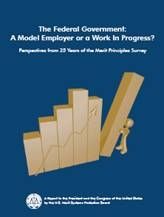 This report summarizes findings from 25 years of survey research have and examines trends over time. The report discusses factors that have likely influenced employee opinion, such as agency, gender, and ethnicity and race. On a positive note, survey results show that the Federal Government has some enduring strengths and has improved in many areas. “We found that the vast majority of Federal employees believe that their work is meaningful and important, and that satisfaction with their pay has increased significantly,” stated Chairman Neil A. G. McPhie. However, survey results also show that challenges remain. This report summarizes findings from 25 years of survey research have and examines trends over time. The report discusses factors that have likely influenced employee opinion, such as agency, gender, and ethnicity and race. On a positive note, survey results show that the Federal Government has some enduring strengths and has improved in many areas. “We found that the vast majority of Federal employees believe that their work is meaningful and important, and that satisfaction with their pay has increased significantly,” stated Chairman Neil A. G. McPhie. However, survey results also show that challenges remain. |
| The Power of Federal Employee Engagement | 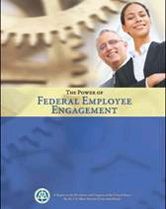 Employees who are fully engaged tend to work in offices that achieve better program results, call in sick less often and stay with their agencies longer, according to a new report by the Merit Systems Protection Board. This report is based on results from a 2005 survey of nearly 37,000 employees at 24 federal agencies, which found that despite dwindling resources and increased pressure to improve programs, agencies can thrive if managers connect with their employees. "Federal supervisors and managers have an important role to play in engaging employees," said MSPB Chairman Neil McPhie. "Those who are successful in engendering these attitudes will lead a more engaged workforce that will produce better outcomes for their agencies." Employees who are fully engaged tend to work in offices that achieve better program results, call in sick less often and stay with their agencies longer, according to a new report by the Merit Systems Protection Board. This report is based on results from a 2005 survey of nearly 37,000 employees at 24 federal agencies, which found that despite dwindling resources and increased pressure to improve programs, agencies can thrive if managers connect with their employees. "Federal supervisors and managers have an important role to play in engaging employees," said MSPB Chairman Neil McPhie. "Those who are successful in engendering these attitudes will lead a more engaged workforce that will produce better outcomes for their agencies." |
| Alternative Discipline: Creative Solutions for Agencies to Effectively Address Employee Misconduct | 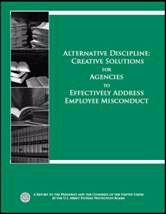 This report contains information on how different agencies are using— or not using—alternative discipline and includes a helpful section on important case law for parties to consider when drafting an alternative discipline agreement. MSPB found few agencies have a formal policy on alternative discipline, and many agencies do not provide formal training or guidance, which leaves supervisors and organizations to learn about alternative discipline on their own. “Alternative discipline is a great tool for supervisors to consider if they have an employee who is engaging in misconduct,” says MSPB Chairman Neil A.G. McPhie. “It empowers proposing and deciding officials to work with the misbehaving employee in order to craft a solution that has the greatest potential to change that employee’s conduct. Traditional discipline should remain an option for management. This report contains information on how different agencies are using— or not using—alternative discipline and includes a helpful section on important case law for parties to consider when drafting an alternative discipline agreement. MSPB found few agencies have a formal policy on alternative discipline, and many agencies do not provide formal training or guidance, which leaves supervisors and organizations to learn about alternative discipline on their own. “Alternative discipline is a great tool for supervisors to consider if they have an employee who is engaging in misconduct,” says MSPB Chairman Neil A.G. McPhie. “It empowers proposing and deciding officials to work with the misbehaving employee in order to craft a solution that has the greatest potential to change that employee’s conduct. Traditional discipline should remain an option for management. |
| In Search of Highly Skilled Workers: A Study on the Hiring of Upper Level Employees from Outside the Federal Government |
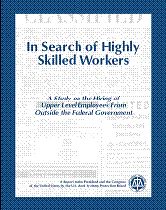 The MSPB conducted this study to find ways to improve the Federal Government ability to compete with other employers for highly skilled, well experienced and much sought after workers. This report presents findings on the hiring of new employees at the upper level grades 12 13, 14, and 15 in the General Schedule or equivalent in fiscal year 2005 and offers a number of recommendations that agencies and policy makers may consider to improve the hiring of highly skilled workers. The MSPB conducted this study to find ways to improve the Federal Government ability to compete with other employers for highly skilled, well experienced and much sought after workers. This report presents findings on the hiring of new employees at the upper level grades 12 13, 14, and 15 in the General Schedule or equivalent in fiscal year 2005 and offers a number of recommendations that agencies and policy makers may consider to improve the hiring of highly skilled workers. |
| Attracting the Next Generation: A Look at Federal Entry-Level New Hires | 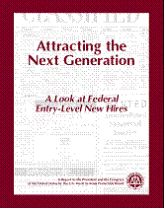 Who are Federal Agencies hiring to fill entry-level positions? Why do they come to work for the Federal Government? What were they looking for in a job? These questions form the basis for this MSPB report. Ultimately, the results of this study demonstrate that the Federal Government can more ably compete for entry-level new hires than some of the contemporary research suggests, but there is much room for growth. The Chairman notes, "there are some troublesome trends that could thwart merit-based hiring over time." MSPB makes a number of recommendations that agencies and Federal policy makers should consider when reflecting on how to improve the Federal hiring process. Who are Federal Agencies hiring to fill entry-level positions? Why do they come to work for the Federal Government? What were they looking for in a job? These questions form the basis for this MSPB report. Ultimately, the results of this study demonstrate that the Federal Government can more ably compete for entry-level new hires than some of the contemporary research suggests, but there is much room for growth. The Chairman notes, "there are some troublesome trends that could thwart merit-based hiring over time." MSPB makes a number of recommendations that agencies and Federal policy makers should consider when reflecting on how to improve the Federal hiring process. |
| Accomplishing Our Mission - Results of the Merit Principles Survey 2005 |
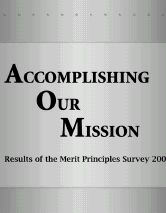 Accomplishing Our Mission - Results of the Merit Principles Survey 2005, discusses the views of Federal employees who participated in the most recent Merit Principles Survey. This report summarizes the responses of 36,926 Federal employees who completed this online survey—a representative sample of the 1.8 million full-time, permanent employees of the Federal Government. The report reveals that Federal employees generally believe they are well managed, have jobs that they like, and are highly motivated by the opportunity to help their agencies succeed. Accomplishing Our Mission - Results of the Merit Principles Survey 2005, discusses the views of Federal employees who participated in the most recent Merit Principles Survey. This report summarizes the responses of 36,926 Federal employees who completed this online survey—a representative sample of the 1.8 million full-time, permanent employees of the Federal Government. The report reveals that Federal employees generally believe they are well managed, have jobs that they like, and are highly motivated by the opportunity to help their agencies succeed. |
| A Report on the Proceedings - The Practice of Merit, A Symposium | 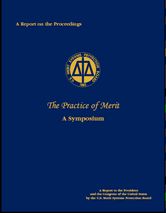 Chairman Neil A. G. McPhie said, “The Board, as the guardian of merit, is committed to providing relevant information that will assist agencies in managing their workforce in accord with the merit system principles.” In support of this goal, the Board convened a one-day conference on April 20, 2006, at the National Press Club in Washington, DC, to highlight how agencies operating outside the traditional civil service system practice merit when managing their workforce. In its continuing effort of providing practical information to Federal agencies, the MSPB has published the symposium’s proceedings. Agencies searching for ways to improve the effectiveness of their workforce can find practical examples in the report for possible implementation. Chairman Neil A. G. McPhie said, “The Board, as the guardian of merit, is committed to providing relevant information that will assist agencies in managing their workforce in accord with the merit system principles.” In support of this goal, the Board convened a one-day conference on April 20, 2006, at the National Press Club in Washington, DC, to highlight how agencies operating outside the traditional civil service system practice merit when managing their workforce. In its continuing effort of providing practical information to Federal agencies, the MSPB has published the symposium’s proceedings. Agencies searching for ways to improve the effectiveness of their workforce can find practical examples in the report for possible implementation. |
| Navigating the Probationary Period after Van Wersch and McCormick |
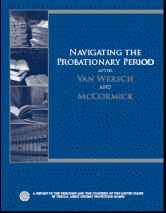 MSPB MAKES CLEAR HOW IT’S POSSIBLE FOR PROBATIONERS TO HAVE APPEAL RIGHTS Since the U.S. Court of Appeals for the Federal Circuit issued its decisions in Van Wersch v. Department of Health and Human Services and McCormick v. Department of the Air Force, the interpretation of the factors affecting whether an employee serving in a probationary period has appeal rights has changed. “Federal agencies and employees need to understand the outcomes of these decisions to know whether an individual employed by the U.S. Government has full procedural and appeal rights upon termination, even when employed in a probationary or trial status,” said Chairman Neil A. G. McPhie. MSPB MAKES CLEAR HOW IT’S POSSIBLE FOR PROBATIONERS TO HAVE APPEAL RIGHTS Since the U.S. Court of Appeals for the Federal Circuit issued its decisions in Van Wersch v. Department of Health and Human Services and McCormick v. Department of the Air Force, the interpretation of the factors affecting whether an employee serving in a probationary period has appeal rights has changed. “Federal agencies and employees need to understand the outcomes of these decisions to know whether an individual employed by the U.S. Government has full procedural and appeal rights upon termination, even when employed in a probationary or trial status,” said Chairman Neil A. G. McPhie. |
View Studies Archive |